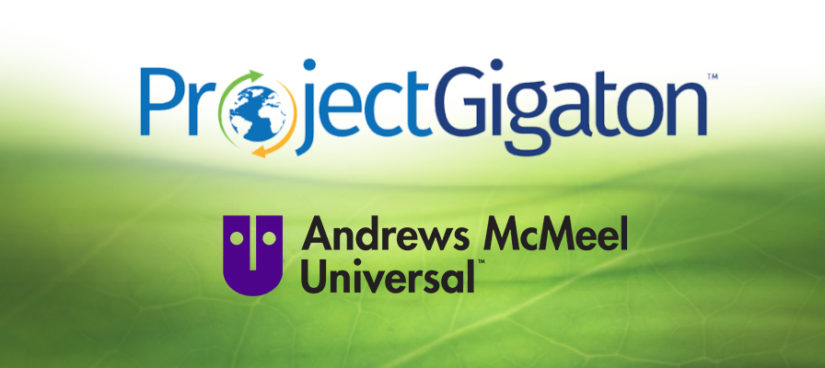
Andrews McMeel takes sustainability to a new level
Andrews McMeel is excited to announce its participation in Project Gigaton, a Walmart initiative that aims to avoid one billion metric tons (a gigaton) of greenhouse gases by 2030.
For four years, Andrews McMeel Publishing (AMP) has reported its sourcing practices as part of Walmart’s Sustainability Initiative, which requires AMP to work with printers and paper mills to ensure its products are produced in an ethical manner. Project Gigaton builds on this substantially.
To participate in Project Gigaton, companies must commit to an annual goal and then report its impact. AMP’s 2020 goal is to print all calendar titles headed to Walmart on FSC®-certified paper. Cliff Koehler, AMP vice president of Production, will use calculation models provided by Walmart and accepted by the environmental community to estimate greenhouse gas reduction in metric tons for all Walmart calendars produced, as well as calendars printed on FSC®-certified paper for general trade. Once Andrew McMeel reports on its first goal in Fall 2020, it will officially be added to Project Gigaton’s Supplier Recognition list.
“The use of FSC®-certified paper is already in place for a few licensors — Thomas Kinkade Disney Dreams calendars, for example — and for certain Australian and UK customers on select calendar titles,” said Koehler.
AMP will continue to set and measure annual sustainability goals in support of Project Gigaton. A goal can support one of six “pillars,” or categories, that Walmart has selected as areas with the most opportunity for improvement: Energy, Agriculture, Waste, Packaging, Forests and Product Use. Eventually, Andrews McMeel can set a broad emissions-reduction goal and then calculate total emissions savings for the year (without breaking it down by category).
Most important, going forward, all company emissions reductions can be counted on this survey, not just Walmart-specific activity. For example, any changes that AMU makes, such as developing a recycling program, reducing its building’s energy consumption, or subscribing to or investing in renewable energy through its utility company Evergy, would qualify as goals within Project Gigaton.
As more American publishers move toward higher percentages of FSC® and SFI (Sustainable Forestry Initiative) paper, it fuels increased supply for such products, therefore lowering the price so additional publishers can afford to use them on a larger scale. AMU is in good company with other well-known publishers, like Penguin Random House, Hachette, Scholastic and Macmillan, who have their own sustainability initiatives to help reduce the carbon footprint of the book production process. By contributing to Project Gigaton, Andrews McMeel also joins major contributors, such as 3M, Hasbro, Hallmark, Johnson & Johnson and P&G. (View the full list of 250+ companies, as well as their specific company goals.)
For more information on the background of Project Gigaton, sustainable paper sources or the scientific community’s findings regarding greenhouse gas emissions and their contributions to global warming, check out the sources listed below:
Walmart Sustainability Hub/Project Gigaton
Forest Stewardship Council (FSC)
Sustainable Forestry Initiative (SFI)
IPCC: “Climate Change 2014” Report
United Nations Environment Programme (UNEP): “Emissions Gap Report 2019”
